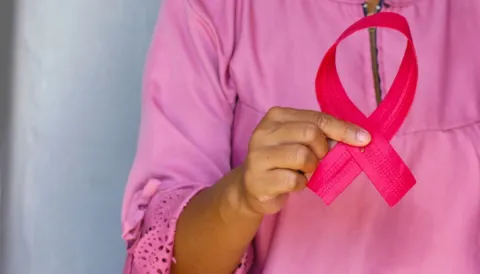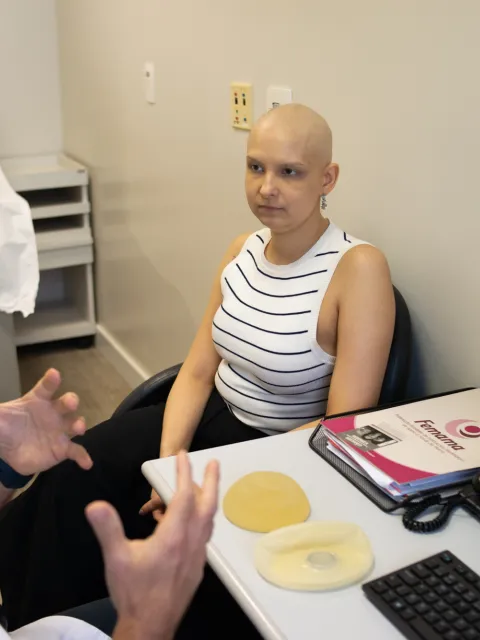UICC awards 15 new grants to improve early detection of breast cancer
On the occasion of Breast Cancer Awareness Month, UICC announces the launch of 15 new projects to improve the early detection of breast cancer.

Late diagnosis and low survival rates constitute a common challenge faced by breast cancer organisations in low-income settings around the world.
Virtual Dialogue on metastatic breast cancer
This webinar on 3 October will propose a number of actions for change to improve and extend the lives of people living with advanced breast cancer.
Breast cancer is now the most commonly diagnosed cancer globally. On the occasion of Breast Cancer Awareness Month, celebrated every October for the past 90 years, UICC is pleased to announce that 15 grants have been awarded to support member organisations working in this field.
Applications from 71 organisations were reviewed by an independent Review Committee consisting of 13 international experts in breast cancer. The Review Committee was chaired by Dr Julie Gralow, Chief Medical Officer and Executive Vice President of the American Society of Clinical Oncology (ASCO).
While each initiative is focused on a particular national or regional context, each project seeks to address the issue of late diagnosis: a common challenge faced by breast cancer organisations in low-income settings around the world. When breast cancer is detected at an early stage, survival rates can be higher than 80 or even 90%. Many women in low- and middle-income countries, however, are being diagnosed with advanced, metastatic breast cancer, which is much harder to treat.
The grants address two of the three pillars of the WHO Global Breast Cancer Initiative, which aims to avert 2.5 million deaths by 2030, namely health promotion and early detection, and timely diagnosis. The 15 projects to be supported will receive up to USD 20,000 each, and will focus on the following topics:
- Promotion of breast health, breast cancer symptoms and addressing the stigma of the disease, encouraging individuals to seek medical advice as early as possible.
- Training of health care workers to identify symptoms and help patients navigate through the health system and services.
- Connecting hard-to-reach populations to existing services where available.
- Improving the coordination of services and referral systems for timely and quality diagnosis.
- Advocacy campaigns leading to broad stakeholder engagement and additional resources for early detection
Master course to support breast cancer control projects
Apply now to attend UICC’s Master course on 'Good practices for planning and implementing breast cancer projects' as part of its Breast Cancer Programme.
The review and selection process for the grants sought to ensure that any project supported includes access to referral systems and follow-up treatment and care for those diagnosed, of critical importance where efforts to increase early detection and timely diagnosis are being implemented.
Projects are set to start in October and will be implemented for a maximum duration of one year. Organisations come from 14 different countries and represent the Asia Pacific, African, Latin American, North American and European regions. Institutions awarded encompass universities, hospitals and civil society organisations.
Spotlight on three grants in El Salvador, Nepal and Rwanda
El Salvador – Asociación Salvadoreña para la Prevención del Cáncer
This pilot project by the Salvadoran association for the prevention of cancer (Asociación Salvadoreña para la prevención del Cáncer, ASAPRECAN) seeks to strengthen the national strategy for the early detection of breast cancer in El Salvador. It will do so by training health personnel in clinical breast evaluation and how to raise awareness at the community level, as well as in ultrasound-guided fine-needle aspiration (US-FNA) as a triage method for breast abnormalities detected by the evaluation; and a timely referral to the corresponding highest health service.
Care model and educational materials developed and previously tested in Peru will be reviewed and adapted for use in El Salvador by a multidisciplinary group of experts.
"In El Salvador, more than 30% of women with breast cancer already have advanced cancer at the time of diagnosis. Unlike countries with higher resources where this percentage does not exceed 8%. Our project is aimed at reducing this inequality by strengthening the skills of health professionals at the primary care level and increasing women's awareness of the benefits of early detection of breast cancer".
– Lisseth Ruiz de Campos, President of ASAPRECAN
Nepal – B.P. Koirala Memorial Cancer Hospital
B.P. Koirala Memorial Cancer Hospital (BPKMCH) is the largest government cancer hospital in Nepal and provides comprehensive breast cancer diagnosis and treatment services.
BPKMCH’s project aims to educate and train primary health workers and female community health volunteers to identify breast symptoms and help women appropriately navigate the health system for their referrals. The project will be implemented in three districts and target underserved areas inhabited by an ethnic minority populations.
“Better equity in breast cancer early diagnosis means every woman in the society is equally aware of early signs and the referral mechanism for diagnosis. This can be largely achieved if primary health care workers are well trained to recognise early signs and symptoms of breast cancer, and help women to appropriately navigate the referral mechanisms in the existing health system. Trained PHCWs can be the key gateway for early diagnosis of breast cancer in limited resource settings like Nepal, which we want to achieve through this project.”
– Asmita Rana, Project Leader, B.P. Koirala Memorial Cancer Hospital
Rwanda – Rwanda Cancer Relief
Sessions on breast cancer at the World Cancer Congress
Registered participants at the World Cancer Congress will be able to access, in person or online, a number of sessions dedicated to breast cancer control.
While Rwanda has made significant advances in cancer control, often cited as an example of what can be achieved in low-resource settings, the majority of individuals diagnosed with breast cancer continue to present with advanced and metastatic disease.
The educational project developed by Rwanda Cancer Relief (RCR) aims to provide breast cancer-specific training, skills and resources to primary care physicians, to enable them not only to better detect breast cancer, but also to refer patients for the appropriate care more rapidly.
“As we aim to move towards a model of comprehensive cancer control, RCR prides itself in running a program together with UICC to provide breast cancer-specific training, skills and resources, in order to improve early detection of breast cancer and decrease the time to referrals. We strongly believe this will strengthen continued equitable access to cancer treatment and care for everyone in our country.”
– Niyibizi Asuman Brandon, Project Leader, Rwanda Cancer Relief
UICC is grateful for the support of its Breast Cancer Programme partners in enabling UICC to provide this opportunity to its members, in particular funding raised by the Pink Dial project, organised by Revolution Watch.
Last update
Wednesday 16 November 2022
